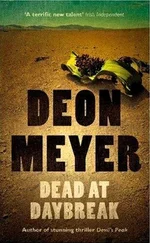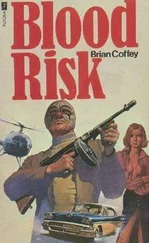Deon Meyer - Blood Safari
Здесь есть возможность читать онлайн «Deon Meyer - Blood Safari» весь текст электронной книги совершенно бесплатно (целиком полную версию без сокращений). В некоторых случаях можно слушать аудио, скачать через торрент в формате fb2 и присутствует краткое содержание. Жанр: Старинная литература, на английском языке. Описание произведения, (предисловие) а так же отзывы посетителей доступны на портале библиотеки ЛибКат.
- Название:Blood Safari
- Автор:
- Жанр:
- Год:неизвестен
- ISBN:нет данных
- Рейтинг книги:4 / 5. Голосов: 1
-
Избранное:Добавить в избранное
- Отзывы:
-
Ваша оценка:
- 80
- 1
- 2
- 3
- 4
- 5
Blood Safari: краткое содержание, описание и аннотация
Предлагаем к чтению аннотацию, описание, краткое содержание или предисловие (зависит от того, что написал сам автор книги «Blood Safari»). Если вы не нашли необходимую информацию о книге — напишите в комментариях, мы постараемся отыскать её.
In Blood Safari
A complicated man with a dishonorable past, Lemmer just wants to do his job and avoid getting personally involved. But as he and Emma search for answers from the rural police, they encounter racial and political tensions, greed, corruption, and violence unlike anything they have ever known.
Blood Safari — читать онлайн бесплатно полную книгу (весь текст) целиком
Ниже представлен текст книги, разбитый по страницам. Система сохранения места последней прочитанной страницы, позволяет с удобством читать онлайн бесплатно книгу «Blood Safari», без необходимости каждый раз заново искать на чём Вы остановились. Поставьте закладку, и сможете в любой момент перейти на страницу, на которой закончили чтение.
Интервал:
Закладка:
‘Amen’ echoed around the table. Dishes were offered, children encouraged to take vegetables. There were short silences: a secret consciousness of the stranger in their midst and a subtle insecurity about the correct form of interaction. I was a guest, but also an employee, an intruder with an interesting job. The boy watched me with unashamed curiosity. ‘Have you really got a gun?’ he asked. His mother hushed him and said, ‘Don’t mind him.’
I forked turkey on to my plate. The hostess said, ‘It’s just leftovers.’ Carel said, ‘It’s delicious, Ma.’
Someone introduced the weather forecast as a topic and conversation began to flow – plans for the next day, how the children could be kept occupied, whose turn it was to braai. Emma did not join in. Her attention was on her food, but she ate little.
I became aware of an unnatural geniality between them, despite my presence. There was no conflict here, no fraternal rivalry, and none of the usual banter between couples. It was rather like one of those ideal families portrayed on an American TV programme. It was emanating from the way Carel had the final say, the casting vote. Their submission was barely noticeable, interlaced with a cheerful, practised pattern of interaction, but it was there, bowing to the benign despot – the one with the wallet and the fortune.
How did Emma fit into all this?
Once the plates were emptied and a discussion of the next day’s golf had ended, Carel decided that it was time to engage me. He waited for a moment of quiet and gave me an intimate smile.
‘Now we know what the ghosts looks like, Mr Lemmer.’
For a fraction of a second I didn’t know what he was talking about. Then I got it. He had had previous dealings with Body Armour but had the wrong end of the stick.
To all appearances Jeanette Louw is a lesbian in her fifties with big bottle-blonde hair, a dreadful smoking habit – Gauloise was her brand of choice – and an outspoken preference for seducing recently divorced, hurting, heterosexual women. But hidden behind that front was a razor-sharp intellect and a brain for business.
She had been the legendary regimental sergeant-major of the Women’s Army College in George, before taking her package seven years ago. After months of market research she had opened her own business on the sixteenth floor of a luxury office building in the Cape Beachfront area. On the glass double doors, through which you could see Jolene Freylinck, the manicured receptionist, BODY ARMOUR was printed in bold, masculine letters and the explanatory ‘Personal Executive Security’ below in slim sans serif.
Initially, her clients were foreign businessmen, the senior executives of international corporations who came to find out how a quick buck could be squeezed from Africa. Their embassies had whispered in confidential reports that the country was stable enough for investment, but safety on the streets was not quite up to Western standards. Jeanette aimed her marketing at the diplomats, the economic attachés and consuls, the embassy clerks and switchboard operators. Would their important visitors prefer to avoid the long list of personal threats, the muggings, car hijackings, assaults, rapes, abductions and break-ins? Body Armour was the answer. The first few clients went home safely and her reputation grew. Gradually the whole spectrum from East to West had hired her specialists: Japanese, Koreans, Chinese, Germans, French, Brits and Americans.
Then the foreigners began to make movies in the Cape, and the pop stars of the world came to sell their concert tickets to the boere and her client list took on a new dimension. Snapshots of Jeanette with Colin Farrell, Oprah, Robbie Williams, Nicole Kidman and Samuel L. Jackson preened on her walls. She would sit behind her desk and tell you about the big ones that got away. Will Smith and his huge entourage, including his own American bodyguards who travel around him like African praise singers. Sean Connery had earned her eternal admiration by turning down her service with a ‘Do you think I’m a fucking wimp?’
As with similar services the world over, Jeanette’s portfolio of hand-picked freelance bodyguards took on a two-part character. First, there were the deterrents – those highly visible, muscle-bound, thick-necked, steroid-bulked colossi that accompany the famous and keep hoi polloi at bay through visual intimidation. Their sole qualifications were the intimidating size of their torso and limbs and the ability to scowl in a menacing manner.
In the other branch of Jeanette’s service were those whose job was to manage more subtle but also largely imaginary threats. They had to flatter the client’s ego with a curriculum vitae reflecting both official training and high-profile experience. They preserved the illusion of danger by moving in the periphery, incessantly observing and evaluating. Sometimes they worked in teams of two, four or six with tiny concealed ear- and microphones. Sometimes they worked alone, depending on the size of the client group, the financial means, or the nature of the risk. They had to blend into the environment the client was moving through, appearing only to whisper polite suggestions at convenient moments. The client expected that, because film and television had set the standard of behaviour. (I had a Scandinavian businesswoman who insisted I wear an earphone complete with a trailing wire disappearing down my collar, despite the fact that I was working alone and had no one to communicate with.)
Consequently, Jeanette Louw would ask prospective clients or their agent: ‘Do you need a gorilla, or an invisible.’ In the world of the rich and famous it was recognised terminology.
But Carel-know-it-all hadn’t got it quite right. His mistake told me something – his knowledge was only fragmentary.
‘When you hire a bodyguard, Jeanette asks you if you want a ghost or a gorilla,’ he explained to the rest of the table. ‘We have only used the gorillas for the celebrities who come to make ads.’
I couldn’t think of an appropriate response. The situation was strange to me. The employee didn’t usually sit at the same table as the employer – it was socially unacceptable. Add to that my own lack of enthusiasm for small talk. But Carel didn’t require a response.
‘The gorillas are the big guys,’ he said. ‘They look like nightclub bouncers. But the ghosts are the real pros. The ones that guard state presidents and ministers.’
They stared at me, the whole table.
‘Is that your background too, Mr Lemmer?’ Carel asked. It was an invitation, but I turned it down with a mere nod, slight and unenthusiastic.
‘There you are, Emma. You’re in good hands,’ said Carel.
Good hands. I suspected that Carel did not have first-hand experience of the hiring process at Body Armour. It was something he left to subordinates. If he had handled it himself, he would have known that Jeanette had a price list and I wasn’t anywhere near the top. My place was in the bargain basement, the one that didn’t like teamwork, the one with a secret history and defective public relations.
Did Emma know? Surely not. Jeanette was too professional. She would have asked, ‘How much would you like to spend?’ and Emma would have said she had no idea of the cost. ‘Anything between ten thousand rand a day for a team of four and seven hundred and fifty for a solo operator.’ Jeanette would have explained the choices without mentioning her twenty per cent cut, plus administrative charge, unemployment insurance, income tax and bank transfer fees.
What did a brand consultant earn? How big a chunk of that was R750 per day, R5,250 per week, R21,000 a month? Not small change, especially for imaginary threats.
‘I’m sure I am,’ said Emma with a distant smile, as if her thoughts were somewhere else.
Читать дальшеИнтервал:
Закладка:
Похожие книги на «Blood Safari»
Представляем Вашему вниманию похожие книги на «Blood Safari» списком для выбора. Мы отобрали схожую по названию и смыслу литературу в надежде предоставить читателям больше вариантов отыскать новые, интересные, ещё непрочитанные произведения.
Обсуждение, отзывы о книге «Blood Safari» и просто собственные мнения читателей. Оставьте ваши комментарии, напишите, что Вы думаете о произведении, его смысле или главных героях. Укажите что конкретно понравилось, а что нет, и почему Вы так считаете.












